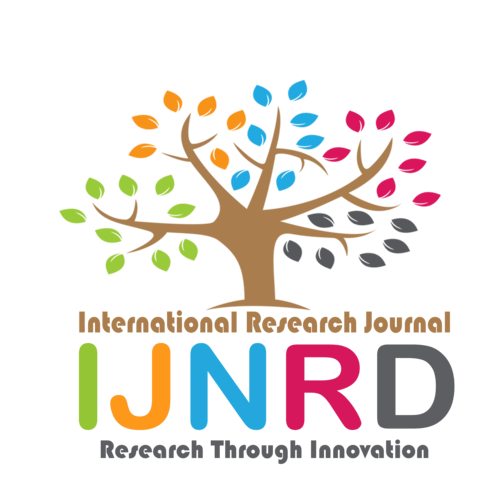|
|||||||||||||||

|
INTERNATIONAL JOURNAL OF NOVEL RESEARCH AND DEVELOPMENT International Peer Reviewed & Refereed Journals, Open Access Journal ISSN Approved Journal No: 2456-4184 | Impact factor: 8.76 | ESTD Year: 2016 Scholarly open access journals, Peer-reviewed, and Refereed Journals, Impact factor 8.76 (Calculate by google scholar and Semantic Scholar | AI-Powered Research Tool) , Multidisciplinary, Monthly, Indexing in all major database & Metadata, Citation Generator, Digital Object Identifier(DOI) |
||||||||||||||
Issue: May 2024
Volume 9 | Issue 5
Review Result and Publication of Paper within : 2-3 days
Click Here For more DetailsFor Authors
Forms / Download
Published Issue Details
Editorial Board
Other IMP Links
Facts & Figure
Impact Factor : 8.76
Issue per Year : 12
Volume Published : 9
Issue Published : 96
Article Submitted :
Article Published :
Total Authors :
Total Reviewer :
Total Countries :
Indexing Partner
Join RMS/Earn 300
Licence
This work is licensed under a Creative Commons Attribution-NonCommercial 4.0 International License







|
Published Paper Details
|
|
| Paper Title: | Federated Learning for Edge Devices |
| Authors Name: | B S S JOSHITH VARMA , MOHAMMED JAVED HUSSAIN |
| Download E-Certificate: | Download |
| Author Reg. ID: |
IJNRD_212708
|
| Published Paper Id: | IJNRD2401217 |
| Published In: | Volume 9 Issue 1, January-2024 |
| DOI: | |
| Abstract: | Federated Learning (FL) is a collaborative paradigm in machine learning that has become a powerful tool, enabling the training of models across decentralized devices. This study explores the intersection of Federated Learning with Edge Devices (FLEDs), concentrating on the complexities of deploying machine learning models at the edge. Edge devices, known for their restricted computational capabilities and intermittent connectivity, present distinct challenges and opportunities for FL. This research systematically addresses these challenges and emphasizes the significance of FL across a wide range of practical applications. The exploration commences with a thorough review of existing literature, clarifying the dynamic landscape of Federated Learning and Edge Computing while identifying areas that merit further investigation. Subsequently, the study delves into challenges specific to FLEDs, such as computational limitations and varying network conditions, opening avenues for tailored solutions. The proposed solutions involve sophisticated model compression algorithms, communication protocols, and adaptive learning strategies tailored for FLEDs. Experimental results showcase the effectiveness of these approaches, highlighting improvements in model convergence, accuracy, and the efficient use of resources across diverse edge devices. In discussing the practical applications of Federated Learning for Edge Devices, this paper presents detailed case studies to underscore the versatility and impact of the approach. In the healthcare sector, FLEDs facilitate collaborative model training on decentralized patient data, ensuring privacy while advancing personalized medicine. In the Internet of Things (IoT) domain, edge devices collaboratively learn from each other, supporting context-aware decision-making and energy-efficient operations. Smart cities leverage FLEDs for traffic prediction, optimizing traffic flow without compromising individual privacy and contributing to resilient and efficient urban infrastructure. Privacy and security considerations are integral to FL deployment, and the paper addresses these concerns by exploring privacy-preserving techniques applicable to FLEDs. This ensures the secure and confidential handling of decentralized data, fostering trust in collaborative learning environments. In conclusion, the paper outlines future directions for Federated Learning in Edge Devices, emphasizing its potential in diverse applications such as industrial IoT, environmental monitoring, and disaster response. These findings contribute to the broader discussion on decentralized, privacy-preserving machine learning applications, showcasing FL's transformative impact on addressing real-world challenges. |
| Keywords: | 1. Federated Learning (FL) 2. Edge Devices (FLEDs) 3. Machine Learning Models 4. Decentralized Data Processing 5. Collaborative Paradigm 6. Resource Efficiency 7. Privacy-Preserving Methodology 8. Contemporary Technological Ecosystems 9. Centralized Models 10. Model Training 11. Ubiquitous Computing 12. Privacy and Security Considerations 13. Edge Computing Architectures 14. IoT Deployments 15. Low-Latency Applications 16. Real-Time Decision-Making 17. Computational Constraints 18. Model Compression Algorithms 19. Communication Protocols 20. Adaptive Learning Strategies 21. Privacy Concerns 22. Resource-Constrained Edge Environments 23. Comprehensive Experiments 24. Model Convergence 25. Accuracy Evaluation |
| Cite Article: | "Federated Learning for Edge Devices", International Journal of Novel Research and Development (www.ijnrd.org), ISSN:2456-4184, Vol.9, Issue 1, page no.c130-c140, January-2024, Available :http://www.ijnrd.org/papers/IJNRD2401217.pdf |
| Downloads: | 000118755 |
| ISSN: |
2456-4184 | IMPACT FACTOR: 8.76 Calculated By Google Scholar| ESTD YEAR: 2016 An International Scholarly Open Access Journal, Peer-Reviewed, Refereed Journal Impact Factor 8.76 Calculate by Google Scholar and Semantic Scholar | AI-Powered Research Tool, Multidisciplinary, Monthly, Multilanguage Journal Indexing in All Major Database & Metadata, Citation Generator |
| Publication Details: |
Published Paper ID:IJNRD2401217 Registration ID: 212708 Published In: Volume 9 Issue 1, January-2024 DOI (Digital Object Identifier): Page No: c130-c140 Country: HYDERABAD, Telangana, India Research Area: Computer Engineering Publisher : IJ Publication Published Paper URL : https://www.ijnrd.org/viewpaperforall?paper=IJNRD2401217 Published Paper PDF: https://www.ijnrd.org/papers/IJNRD2401217 |
| Share Article: | |
|
Click Here to Download This Article |
|
| Article Preview | |
|
|
|
Major Indexing from www.ijnrd.org
| Semantic Scholar | Microsaoft Academic | ORCID | Zenodo |
| Google Scholar | ResearcherID Thomson Reuters | Mendeley : reference manager | Academia.edu |
| arXiv.org : cornell university library | Research Gate | CiteSeerX | PUBLON |
| DRJI | SSRN | Scribd | DocStoc |
ISSN Details
 |
 |
ISSN: 2456-4184
Impact Factor: 8.76 and ISSN APPROVED
Journal Starting Year (ESTD) : 2016
DOI (A digital object identifier)
Conference
Open Access License Policy
Important Details
Social Media
| Copyright © 2024 - All Rights Reserved - IJNRD |












Facebook Twitter Instagram LinkedIn